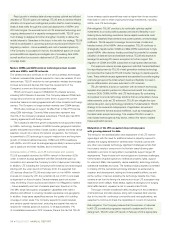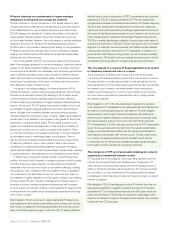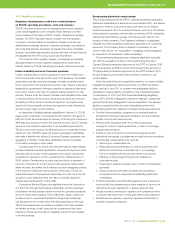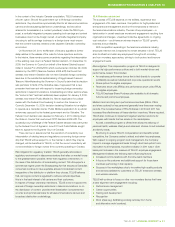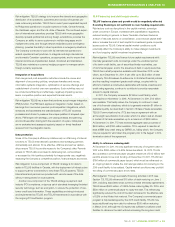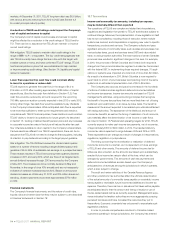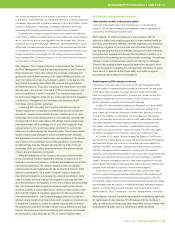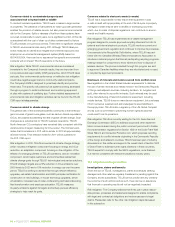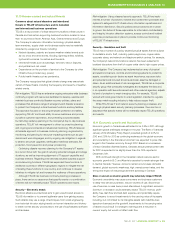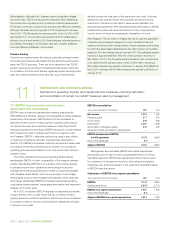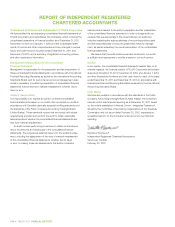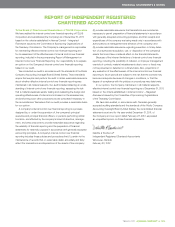Telus 2011 Annual Report Download - page 99
Download and view the complete annual report
Please find page 99 of the 2011 Telus annual report below. You can navigate through the pages in the report by either clicking on the pages listed below, or by using the keyword search tool below to find specific information within the annual report.
TELUS 2011 ANNUAL REPORT . 95
MANAGEMENT’S DISCUSSION & ANALYSIS: 10
into further arrangements for the supply of services in such foreign
jurisdictions. These activities, as well as the offshoring of certain business
processes, have resulted in greater presence in the United States, United
Kingdom, Philippines, Guatemala, El Salvador, Barbados and India,
increasing the Company’s exposure to multiple forms of taxation.
Generally, each foreign jurisdiction has its own taxation peculiarities
in the forms of taxation imposed (such as value-added tax, gross receipts
tax or income tax) and its own legislation and tax treaties with Canada,
as well as currency and language differences. Notwithstanding the usual
differences, the telecommunications industry has unique issues that lead
to uncertainty in the application or division of tax between domestic and
foreign jurisdictions. Accordingly, TELUS’ foreign expansion activities
have increased the Company’s exposure to tax risks, from both financial
and reputation perspectives.
Risk mitigation: The Company follows a Comprehensive Tax Conduct
and Risk Management Policy that has been adopted by the Company’s
Board of Directors. This policy outlines the principles underlying and
guiding the roles of team members, their responsibilities, personal con-
duct, the method of conducting business in relation to tax law and the
approaches to working relationships with external taxing authorities
and external advisors. This policy recognizes the requirement to comply
with tax laws in the context of the rights of TELUS as a taxpayer in the
various jurisdictions in which it operates. The required components
for control and mitigation of tax risk are outlined as well as the delegation
of authority to management on tax matters with Board and Audit
Committee communication guidelines.
In keeping with this policy, the Company maintains an internal
Taxation department composed of professionals who are trained and
educated in taxation administration and who maintain an up-to-date
knowledge base of new developments in the underlying Canadian law,
its interpretations and jurisprudence. TELUS also has an experienced
international team with knowledge of U.S. and other foreign tax laws,
supplemented by U.S. and foreign external advisors, to provide tax
advice and to assess foreign tax issues and risks. These teams review
systems and process changes to ensure compliance with domestic
and applicable international taxation laws and regulations. They are also
responsible for the specialized accounting required for income taxes,
and accordingly, they are charged with maintaining state-of-the-art
knowledge of tax accounting developments and the implementation
of such relevant measures, as required.
Material transactions of the Company are under continual review
by the Company’s Taxation department whereby transactions of an
unusual or non-recurring nature, in particular, are assessed from multiple
risk-based perspectives. Tax-related transaction risks are regularly
com municated to and reassessed by tax counsel as a check to initial
exposure assessments. As a matter of regular practice, large and
international transactions are reviewed by external tax advisors, while
other third-party advisors may also be engaged to express their view
as to the potential for tax exigibility. In 2011, the Company launched phase
two of its enterprise-wide program to review its existing international
structure, systems and processes and to develop a future mode of oper-
ation that will mitigate its regulatory, legal and tax risks as it continues
international expansion. The Company engages external counsel and
advisors as appropriate to provide advice and to prepare or review returns
to enable the Company to comply in material respects with tax laws in
the jurisdictions outside of Canada in which it has operations of any signi-
ficance. The advice and returns provided by such advisors and counsel
are reviewed for reasonableness by TELUS’ internal Taxation team.
10.8 Health, safety and environment
Team member health, wellness and safety
Lost work time resulting from the physical injury or psychological
illness of TELUS team members can negatively impact organizational
productivity and employee benefit costs.
Risk mitigation: To minimize absences in the workplace, TELUS
supports a holistic and proactive approach to team member health by
providing comprehensive wellness, disability, ergonomic and employee
assistance programs. To promote safe work practices, the Company
has long-standing training and orientation programs for team members,
contractors and suppliers who access TELUS facilities. In addition to a
robust active living strategy and proactive health screenings, the wellness
strategy includes comprehensive support and training for managers.
This includes workplace team support programs and access to short-
term and long-term counselling for individual team members. However,
there can be no assurance that these safety and health programs
and practices will be effective in all situations.
Radiofrequency (RF) emission concerns
Cell phones emit low levels of non-ionizing RF electromagnetic fields.
A small number of epidemiological studies have showed that exposure
to RF fields might be linked to certain cancers, while other studies
have not supported this association. Furthermore, animal cancer and
laboratory studies have found no evidence that RF fields are carcino-
genic to laboratory rodents and cause DNA damage.
In May 2011, the International Agency for Research on Cancer (IARC)
noted that a positive association has been observed between long-
term, heavy use of mobile phones and certain brain cancers for which
a causal interpretation is considered to be credible, but that chance,
bias or confounding could not be ruled out with reasonable confidence.
The IARC classified RF electromagnetic fields from wireless phones
as possibly carcinogenic to humans – a classification that includes
267 items such as chloroform, coffee and nickel. The IARC also called
for additional research into long-term, heavy use of mobile phones.
In October 2011, Health Canada updated its Safety of Cell Phones
and Cell Phone Towers advisory, noting that the link between RF emission
exposure and cancer risk is far from conclusive and more research is
needed. The IARC and Health Canada have advised cell phone users
that they can take practical measures to reduce their RF emission
exposure, such as limiting the length of cell phone calls, using hands-free
devices, and replacing cell phone calls with text messages. In addition,
Health Canada encourages parents to take these measures to reduce
their
children’s RF emission exposure from cell phones since children are
typically more
sensitive to a variety of environmental agents.
There can be no assurance that future studies, government regu-
lations or public concerns about the health effects of RF emissions will
not have an adverse effect on the business and prospects of TELUS.
For example, public concerns could reduce subscriber growth and usage,
and increase costs as a result of modifying handsets, relocating wireless
towers, and addressing incremental legal requirements and product
liability lawsuits. TELUS continues to monitor developments in this area.
Risk mitigation: Industry Canada is responsible for establishing safe limits
for signal levels of radio devices. TELUS believes that the handsets it
sells, as well as its cell towers and other associated devices, comply with
all applicable Canadian and U.S. government safety standards.



